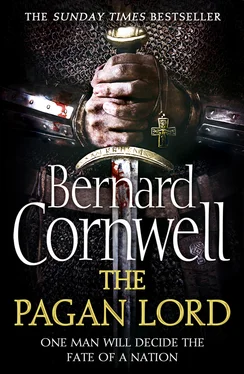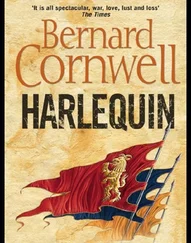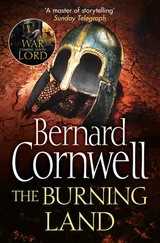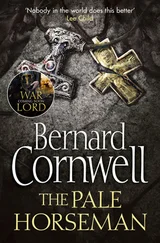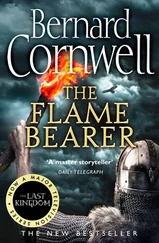We discovered what Cnut Ranulfson wanted that evening when Father Cuthbert came home. The priest was brought by a merchant who traded in pelts, and he had Father Cuthbert on his wagon. It was Mehrasa who alerted us. She screamed.
I was in the big barn that the Danes had not had time to burn, and which we could use for a hall until I built another, and I was watching my men make a hearth from stones when I heard the scream and ran out to see the wagon lurching up the lane. Mehrasa was tugging at her husband while Cuthbert was flailing with his long skinny arms. Mehrasa was still screaming. ‘Quiet!’ I shouted.
My men were following me. The pelt-trader had stopped his wagon and fallen to his knees as I approached. He explained that he had found Father Cuthbert to the north. ‘He was at Beorgford, lord,’ he said, ‘by the river. They were throwing stones at him.’
‘Who was throwing stones?’
‘Boys, lord. Just boys playing.’
So Cnut had ridden to the ford where, presumably, he had released the priest. Cuthbert’s long robe was mud-stained and torn, while his scalp was crusted with blood clots. ‘What did you do to the boys?’ I asked the trader.
‘Just chased them away, lord.’
‘Where was he?’
‘In the rushes, lord, by the river. He was crying.’
‘Father Cuthbert,’ I said, walking to the wagon.
‘Lord! Lord!’ he reached a hand for me.
‘He couldn’t cry,’ I told the trader. ‘Osferth! Give the man money.’ I gestured at the priest’s rescuer. ‘We’ll feed you,’ I told the man, ‘and stable your horses overnight.’
‘Lord!’ Father Cuthbert wailed.
I reached into the cart and lifted him. He was tall, but surprisingly light. ‘You can stand?’ I asked him.
‘Yes, lord.’
I put him on the ground, steadied him, then stepped away as Mehrasa embraced him.
‘Lord,’ he said over her shoulder, ‘I have a message.’
He sounded as if he was crying, and perhaps he was, but a man with no eyes cannot cry. A man with two bloody eye-holes cannot cry. A blinded man must cry, and cannot.
Cnut Ranulfson had gouged out his eyes.
Tameworþig. That was where I was to meet Cnut Ranulfson. ‘He said you would know why, lord,’ Father Cuthbert told me.
‘That’s all he said?’
‘You’d know why,’ he repeated, ‘and you will make it good, and you’re to meet him before the moon wanes or he’ll kill your woman. Slowly.’
I went to the barn door and looked up into the night, but the moon was hidden by clouds. Not that I needed to see how slender its crescent glowed. I had one week before it waned. ‘What else did he say?’
‘Just that you’re to go to Tameworþig before the moon dies, lord.’
‘And make good?’ I asked, puzzled.
‘He said you’d know what that means, lord.’
‘I don’t know!’
‘And he said …’ Father Cuthbert said slowly.
‘Said what?’
‘He said he blinded me so I couldn’t see her.’
‘See her? See who?’
‘He said I wasn’t worthy to look on her, lord.’
‘Look on who?’
‘So he blinded me!’ he wailed and Mehrasa started screeching and I could get no sense from either.
But at least I knew Tameworþig, though fate had never taken me to that town, which lay at the edge of Cnut Ranulfson’s lands. It had once been a great town, the capital of the mighty King Offa, the Mercian ruler who had built a wall against the Welsh and dominated both Northumbria and Wessex. Offa had claimed to be the king of all the Saxons, but he was long dead and his powerful kingdom of Mercia was now a sad remnant split between Danes and Saxons. Tameworþig, which had once housed the greatest king of all Britain, the fortress city that had sheltered his feared troops, was now a decayed ruin where Saxons slaved for Danish jarls. It was also the most southerly of all Cnut’s halls, an outpost of Danish power in a disputed borderland.
‘It’s a trap,’ Osferth warned me.
I somehow doubted it. Instinct is everything. What Cnut Ranulfson had done was dangerous, a great risk. He had sent men, or brought men, deep into Mercia where his small raiding band could easily have been cut off and slaughtered to the last man. Yet something had driven him to that risk. He wanted something, and he believed I possessed it, and he had summoned me, not to one of the great halls deep in his own land, but to Tameworþig that lay very close to Saxon territory.
‘We ride,’ I said.
I took every man who could mount a horse. We numbered sixty-eight warriors, mailed and helmeted, carrying shields, axes, swords, spears and war-hammers. We rode behind my banner of the wolf, and we rode northwards through chill summer winds and sudden spiteful showers of rain. ‘The harvest will be poor,’ I told Osferth as we rode.
‘Like last year, lord.’
‘We’d best look to see who’s selling grain.’
‘The price will be high.’
‘Better that than dead children,’ I told him.
‘You’re the hlaford,’ he said.
I turned in my saddle. ‘Æthelstan!’
‘Lord Uhtred?’ The boy quickened his stallion’s pace.
‘Why am I called a hlaford?’
‘Because you guard the loaf, lord,’ he said, ‘and a hlaford’s duty is to feed his people.’
I grunted approval of his answer. Hlaford is a lord, the man who guards the hlaf, the loaf. My duty was to keep my people alive through winter’s harshness and if that took gold, then gold must be spent. I had gold, but never enough. I dreamed of Bebbanburg, of the fortress in the north that had been stolen from me by Ælfric, my uncle. It was the impregnable fort, the last refuge on Northumbria’s coast, so grim and formidable that the Danes had never captured it. They had taken all of northern Britain, from the rich pastures of Mercia to the wild Scottish frontier, but they had never taken Bebbanburg, and if I was to take it back I needed more gold for men, more gold for spears, more gold for axes, more gold for swords, more gold so that we could beat down the kinsmen who had stolen my fortress. But to do that we would have to fight through all the Danish lands, and I had begun to fear I would die before I ever reached Bebbanburg again.
We reached Tameworþig on the second day of our journey. Somewhere we crossed the frontier between the Saxon and the Danish lands, a frontier that was no fixed line, but was a broad stretch of country where the steadings had been burned, the orchards cut down, and where few animals except the wild beasts grazed. Yet some of those old farms had been rebuilt; I saw a new barn, its timber bright, and there were cattle in some of the meadows. Peace was bringing men to the frontier lands. That peace had lasted since the battle in East Anglia that had followed Alfred’s death, though it had ever been an uncomfortable peace. There had been cattle raids, and slave raids, and squabbles over land boundaries, but no armies had been raised. The Danes still wanted to conquer the south, and the Saxons dreamed of taking back the north, but for ten years we had lived in morose quiet. I had wanted to disturb the peace, to lead an army north towards Bebbanburg, but neither Mercia nor Wessex would give me men and so I too had kept the peace.
And now Cnut had disturbed it.
He knew we were coming. He would have posted scouts to watch all the tracks from the south and so we took no precautions. Usually, when we rode the wild border, we had our own scouts far ahead, but instead we rode boldly, keeping to a Roman road, knowing that Cnut was waiting. And so he was.
Tameworþig was built just north of the River Tame. Cnut met us south of the river, and he wanted to overawe us because he had more than two hundred men standing in a shield wall athwart the road. His banner, which showed a war axe shattering a Christian cross, flew at the line’s centre, and Cnut himself, resplendent in mail, cloaked in dark brown with fur shrouding his shoulders, and with his arms bright with gold, waited on horseback a few paces ahead of his men.
Читать дальше
